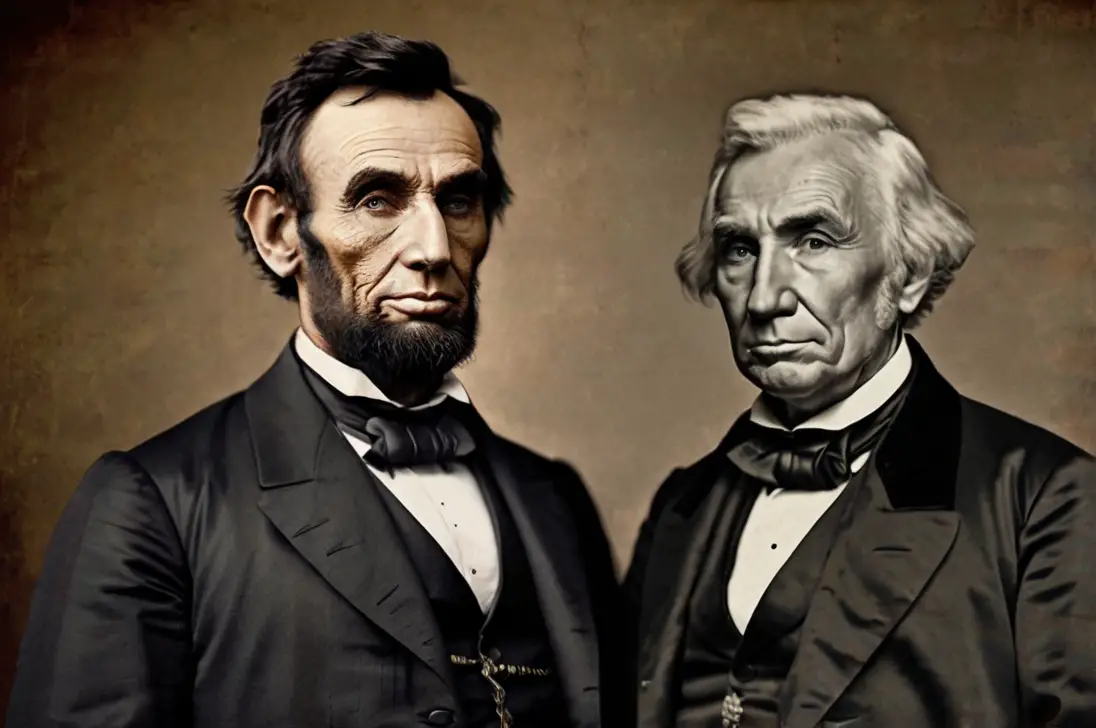
Abraham Lincoln and George Washington are two of the most revered figures in American history.
Both played crucial roles in shaping the United States, with Lincoln serving as the 16th President during the Civil War and Washington as the first President of the United States.
While both leaders left lasting impacts on the nation, their leadership styles, historical contexts, and lasting effects differ significantly.
In this article, we’ll delve into the lives and legacies of these two American icons, exploring their similarities and differences.
Abraham Lincoln

Historical context
Abraham Lincoln was born on February 12, 1809, in a humble log cabin in Kentucky.
His early life was marked by hardship and poverty.
Despite having limited access to formal education, Lincoln was a voracious reader and taught himself many of the skills he needed to succeed.
Through perseverance and self-study, he became a successful lawyer and entered the world of politics.
Lincoln’s journey to becoming the 16th President of the United States in 1861 was driven by his strong opposition to slavery, a stance that defined much of his political career.
- Read also: How Many U.S. Presidents Have Been Assassinated?
- Read also: Liberty vs Equality: The French Revolution vs American Revolution
Leadership style
Lincoln’s leadership style was multifaceted and can be understood through three main aspects:
Crisis leadership
Lincoln’s presidency coincided with the Civil War, a deeply divisive period in American history.
His leadership during this crisis was marked by his ability to navigate the country through immense challenges, including preserving the Union and managing the devastating impacts of war.
Preserver of the union
Throughout the Civil War, Lincoln remained steadfast in his commitment to keeping the United States united.
His determination to maintain the Union was a guiding principle during one of the nation’s darkest times.
The emancipation proclamation
One of Lincoln’s most significant acts was the issuance of the Emancipation Proclamation in 1863.
This executive order declared freedom for millions of enslaved African Americans in Confederate-held territory, marking a crucial step towards ending slavery in America.
Lasting impact
Abraham Lincoln’s impact on American history is profound and far-reaching.
He is perhaps best known for issuing the Emancipation Proclamation in 1863, which declared the freedom of all enslaved people in the Confederate states.
This historic act was a significant step toward ending slavery in the United States and paved the way for the passage of the 13th Amendment, which abolished slavery nationwide.
George Washington

Historical context
George Washington was born on February 22, 1732, in Westmoreland County, Virginia, into a prosperous family.
Unlike many of his contemporaries, he received a formal education and grew up with the advantages of wealth.
His early military career began during the French and Indian War, where he demonstrated bravery and leadership skills that would shape his future.
Leadership style
Founding father
Washington played a crucial role in shaping the American government and its institutions.
As the first President of the United States, he set important precedents for the country’s governance and established the framework for the presidency as we know it today.
Military leader
During the American Revolution, Washington served as the commander-in-chief of the Continental Army.
His strategic prowess and ability to inspire troops were instrumental in securing victory against the British, ultimately leading to America’s independence.
Unifying figure
Washington’s leadership extended beyond the battlefield; he was pivotal in bringing together the thirteen colonies and forging a cohesive nation.
His diplomatic skills and commitment to unity were essential in creating the foundations of the United States of America.
Lasting impact
George Washington’s impact on American history is profound and enduring.
He not only led the country to independence but also laid the groundwork for a strong and stable government.
Washington’s presidency established principles such as civilian control over the military, the importance of a peaceful transition of power, and the authority of the executive branch.
Similarities between Abraham Lincoln vs George Washington
Despite their differences, both Lincoln and Washington shared several key similarities:
Strong moral compass
Both Abraham Lincoln and George Washington were known for their unwavering moral principles.
They believed deeply in doing what was right and just, guided by their sense of morality in their leadership roles.
For Lincoln, this meant fighting against slavery and upholding the Union during the Civil War.
Washington’s moral compass led him to lead the fight for American independence and later to establish a strong foundation for the new nation.
Commitment to liberty
Both leaders were staunch advocates of liberty and democracy.
They understood that freedom was fundamental to the identity and success of the United States.
Washington fought for American independence from British rule, believing in the right of self-determination for the American colonies.
Lincoln, similarly, dedicated himself to preserving the Union and abolishing slavery, believing that all individuals should have the freedom to pursue their own destinies.
Ability to inspire
Lincoln and Washington possessed exceptional abilities to inspire and unite people during challenging times.
Washington’s leadership during the Revolutionary War rallied colonists against British oppression, fostering a sense of unity and purpose among the disparate colonies.
Lincoln’s eloquence and vision during the Civil War uplifted the nation, rallying support for the Union cause and inspiring hope for a better future.
Their ability to inspire hope and unity was crucial in maintaining morale and perseverance during times of crisis.

Key Differences: Abraham Lincoln vs George Washington
While both leaders shared similarities, there were significant differences between them:
| Aspect | Abraham Lincoln |
George Washington
|
| Birth and Background | Born February 12, 1809, in Kentucky to a poor family. |
Born February 22, 1732, in Virginia to a wealthy plantation family.
|
| Education | Had limited formal education; largely self-taught. |
Received a formal education and training in surveying and military tactics.
|
| Early Career | Worked various jobs, including rail-splitter and lawyer. |
Served as a surveyor, then as a military officer during the French and Indian War.
|
| Military Experience | Served briefly in the Illinois Militia during the Black Hawk War. |
Led the Continental Army during the Revolutionary War.
|
| Political Career | Elected to Illinois State Legislature and later U.S. House of Representatives. |
Became a prominent figure in Virginia politics and served in the Virginia House of Burgesses.
|
| Presidency | Elected 16th President of the United States in 1860. |
Elected 1st President of the United States in 1789.
|
| Major Accomplishments | Issued the Emancipation Proclamation and preserved the Union during the Civil War. |
Led the Continental Army to victory in the Revolutionary War and oversaw the ratification of the U.S. Constitution.
|
| Views on Slavery | Opposed the expansion of slavery and sought its eventual abolition. |
Owned slaves but expressed private misgivings about slavery; emancipated his own slaves upon his death.
|
| Legacy | Remembered as the Great Emancipator; his leadership during the Civil War reshaped America. |
Revered as the “Father of His Country”; established many precedents for the presidency and the federal government.
|
| Death | Assassinated on April 15, 1865, shortly after the end of the Civil War. |
Died on December 14, 1799, at his plantation, Mount Vernon.
|
- Read also: Heroes and Villains? 10+ Key Figures of the Cold War
- Read also: Beyond Conspiracies: 7 Assassination of Historical Figures
Conclusion
Abraham Lincoln and George Washington are two of the most revered figures in American history.
While both leaders left lasting impacts on the nation, their leadership styles, historical contexts, and lasting effects differ significantly.
By understanding these differences and similarities, we can gain a deeper appreciation for the complexities of American history and the leaders who shaped it.



